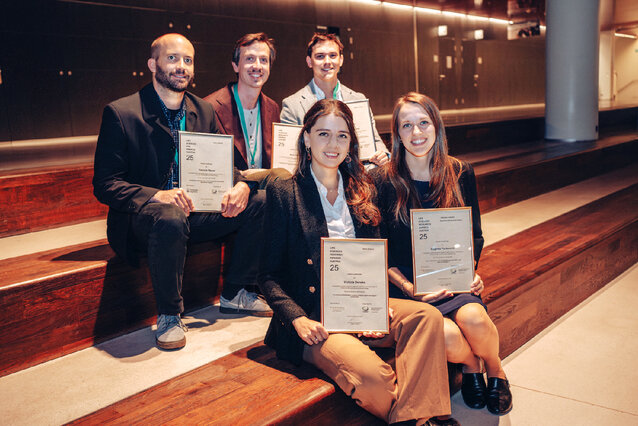Victoria Deneke receives ÖGBMT Life Sciences Research Award Austria
Victoria Deneke, a postdoctoral researcher in the lab of Andrea Pauli, has been awarded the 2025 Life Sciences Research Award Austria for groundbreaking work on the molecular mechanisms of fertilisation. The award was presented during the 17th ÖGMBT Annual Meeting in Innsbruck on 24 September 2025.
Victoria Deneke—a postdoc at the IMP—has been awarded first place in the ‘Basic Research’ category at the Life Sciences Research Awards Austria 2025. Deneke was selected for the honour by the Austrian Association of Molecular Life Sciences and Biotechnology (ÖGMBT) by a jury of renowned scientists for her publication “A conserved fertilisation complex bridges sperm and egg in vertebrates”, published in Cell.
The award-winning study was a joint effort between Deneke and PhD student Andreas Blaha, who share first authorship on the publication. Together with colleagues in the Pauli Lab and collaborators, they combined AI-driven structural predictions with experimental data to reveal the formation of a fertilisation complex that mediates the first contact between sperm and egg. Working across zebrafish, mouse, and human systems, they discovered how a conserved sperm protein complex interacts with different egg proteins, presenting a “lock-and-key” mechanism of fertilisation. These findings open fresh perspectives on the molecular basis of reproduction and provide a foundation for future studies into fertility and reproductive health.
“I am honoured to receive this recognition and grateful to my colleagues, mentors, and collaborators who made this work possible,” said Victoria Deneke. “This award reflects the exciting discoveries we have been able to make in the Pauli lab at the IMP, and I am thrilled to continue exploring fertilisation at the molecular level.”
About Victoria Deneke
Victoria Deneke obtained her bachelor’s degree in chemical engineering from the University of Notre Dame, Indiana, before earning her PhD in Cell Biology from Duke University in 2019, where she studied embryonic cell cycles in the fruit fly Drosophila melanogaster in the lab of Stefano Di Talia. She then joined Andrea Pauli’s lab at the IMP as a postdoc in 2019. Her research focuses on the molecular mechanisms of egg–sperm interaction, with a particular emphasis on characterising a fertilisation complex of sperm proteins conserved across vertebrates.
During her scientific career, Deneke has received several prestigious awards and fellowships, including the Harold M. Weintraub Graduate Student Award, a Human Frontier Science Program (HFSP) Postdoctoral Fellowship, and an FWF ESPRIT Fellowship. In 2019, she was named among the honourable mentions for the IMP’s Birnstiel Award.
About the Life Sciences Research Awards Austria
The Life Sciences Research Awards Austria, organised by the ÖGMBT, recognise outstanding scientific publications by young researchers in the fields of life sciences and biotechnology. Supported by the Federal Ministry for Economy, Energy and Tourism (BMWET), they are the most prestigious life sciences awards a young researcher working in Austria can receive. Each year, awardees and their research are presented to both the scientific community and the wider public, celebrating excellence and innovation in basic and applied research. The ÖGMBT is Austria’s largest network for molecular life sciences and biotechnology, bringing together scientists, professionals, and institutions to promote research, collaboration, and innovation.
Further Reading
“A conserved fertilisation complex bridges sperm and egg in vertebrates.” Cell (2024)
Related links:
